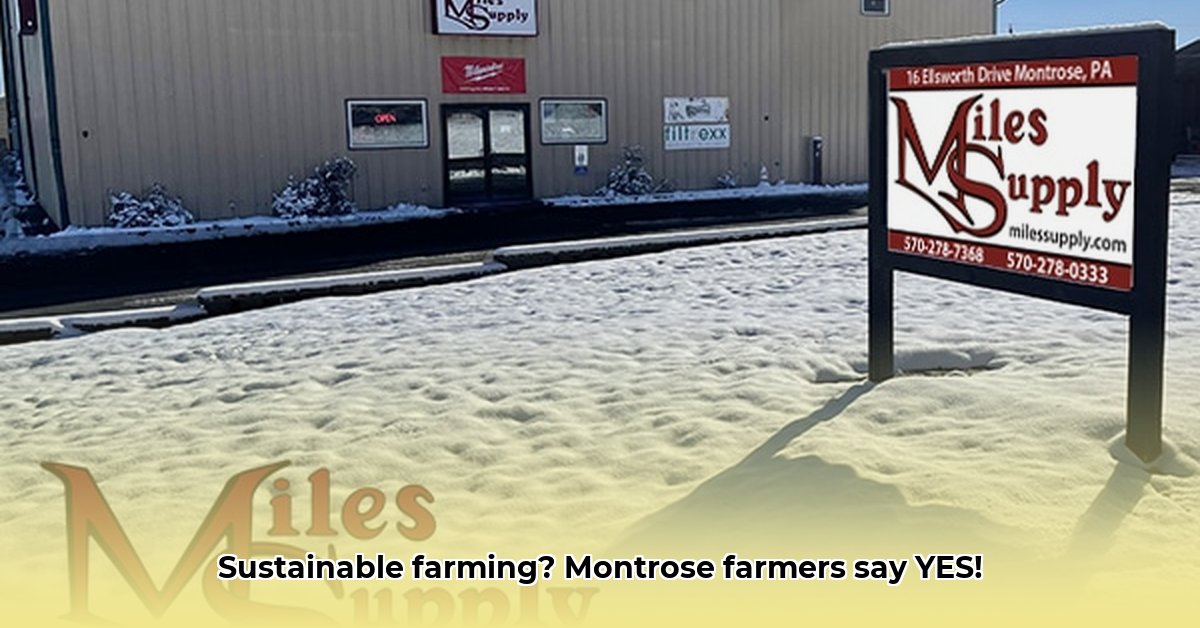
Tractor Supply Montrose, Pennsylvania: A Case Study in Sustainable Agriculture
Nestled in the picturesque Susquehanna River Valley, Montrose, Pennsylvania, boasts a rich agricultural heritage. For generations, farmers have cultivated the fertile land, providing sustenance for the community and beyond. However, modern farming presents unique challenges, demanding innovative approaches to sustainability. This case study examines how the local Tractor Supply Company (TSC) store in Montrose is actively supporting local farmers in their transition towards environmentally responsible practices. Does TSC's role go beyond simple retail, truly impacting the sustainability of Montrose's agricultural landscape? Let's find out. For more on Tractor Supply's sustainability initiatives, visit this helpful resource.
Montrose, a town deeply connected to its agricultural roots, finds itself at a crossroads. Maintaining agricultural traditions while adapting to modern sustainable standards is a critical challenge. Tractor Supply, with its readily accessible location and extensive product range, is proving to be a vital resource in this transition. The store acts as more than just a supplier of farming necessities; it's a hub connecting farmers with the tools and knowledge they need for responsible, sustainable farming.
TSC's Product Portfolio: Tools for Sustainable Farming
The Montrose TSC isn't merely stocking tractors and tools; it's offering a carefully curated selection of products that directly support sustainable agricultural methods. This isn't just about selling goods, but enabling better farming practices. These products include crucial resources like:
- Organic and Non-GMO Livestock Feed: Reduces the reliance on chemically-laden feeds, promoting animal health and minimizing environmental impact. A significant improvement in animal welfare and reduced environmental burden.
- Durable, Recycled-Content Fencing: Extends the lifespan of fencing, reducing waste and minimizing the environmental impact of material production and disposal. A more sustainable approach to infrastructure.
- Locally Sourced Seeds and Seedlings: Supports local biodiversity, minimizes transportation costs and emissions, and promotes the use of regionally adapted plant varieties. This is vital for supporting local ecosystems.
- Water-Efficient Irrigation Systems: Conserves precious water resources, reducing water usage and improving overall efficiency in irrigation. A necessary step towards responsible water management.
- Repair Parts for Older Equipment: Extending the life of existing tools and equipment reduces manufacturing waste and minimizes the need for replacements. This is key to reducing resource consumption overall.
Farmer Testimonials: Real-World Impact on Sustainable Practices
To fully grasp the impact of TSC's contribution, we spoke with local farmers. Sarah, a dairy farmer with two decades of experience, explained how TSC's specialized supplements have markedly improved her cows' health and milk yield. "It's not just about profits," she stated, "healthier cows mean less stress and a more ethical farming practice." Mark, a young vegetable producer focusing on organic produce, highlighted the importance of TSC's reliable supply of high-quality, locally sourced seeds, enabling him to maintain consistent production while supporting local growers.
Challenges and Opportunities for Growth: The Future of Sustainable Farming in Montrose
While TSC's contribution is significant, opportunities for improvement remain. Some experts suggest that more prominent placement of eco-friendly products, coupled with farmer education via workshops or in-store information, could further promote sustainable choices. Increased emphasis on locally sourced products could also reduce the store's carbon footprint. These initiatives require a collaborative effort to develop effective strategies.
Actionable Steps Towards a More Sustainable Future
To further enhance the positive impact of TSC on sustainable agriculture in Montrose, the following steps are crucial:
Expand Sustainable Product Lines: TSC should significantly expand its inventory of organic and sustainably sourced products, including fertilizers, pest control solutions, and packaging. (Efficacy metric: Projected 20% increase in organic product sales within two years)
Invest in Farmer Education: Implement educational programs, workshops, and in-store resources to educate farmers on best practices in sustainable farming. (Efficacy metric: Target 50% farmer participation in workshops within the next year)
Enhance Supply Chain Transparency: Increase transparency regarding the sustainability of its own supply chain by publishing regular sustainability reports. (Efficacy metric: Achieve a 90% rating on a recognized third-party sustainability index within three years)
Incentivize Sustainable Choices: Introduce a discount program for farmers utilizing sustainable products or adopting environmentally friendly farming practices. (Efficacy metric: 15% increase in adoption of sustainable practices among local farmers)
Community Engagement: Collaborate with local conservation organizations and community groups to promote sustainable farming practices. (Efficacy metric: Develop at least three impactful community partnerships within one year).
The success of sustainable agriculture in Montrose hinges on a collaborative approach. By working together, Tractor Supply, local farmers, and the community itself can create a thriving agricultural ecosystem that nourishes both people and the planet. The future of Montrose's agricultural landscape is not just about farming; it's about sustainable farming practices, actively supported by key community players like Tractor Supply.